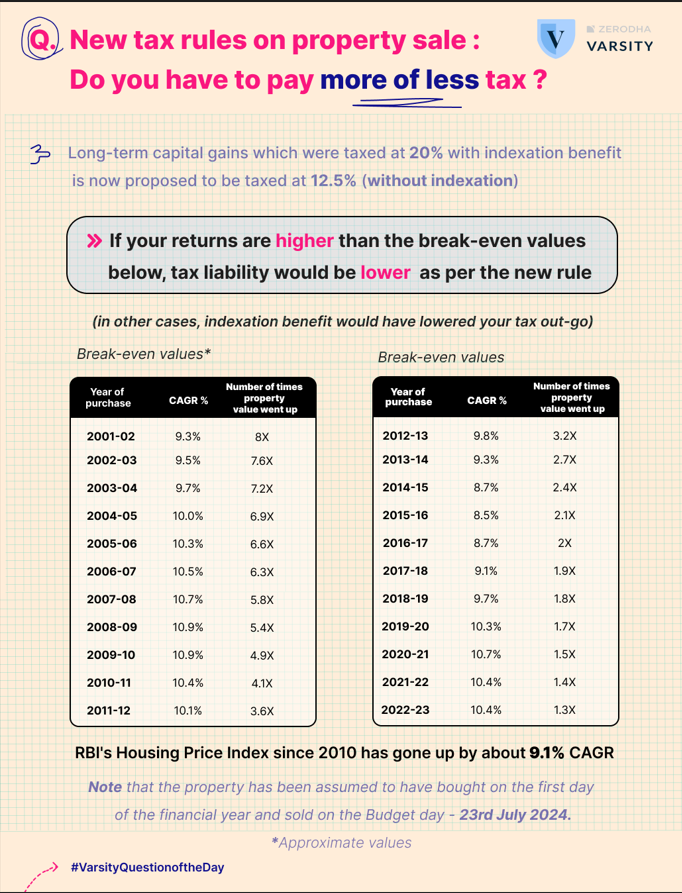
New tax rules on property sales in Budget 2024: Do you have to pay more or less tax now?
In the recent Budget 2024, one of the many proposals announced by Finance Minister Nirmala Sitharaman is the removal of the indexation benefit on long-term capital assets. Since real estate properties are big purchase items, these assets would be significantly impacted. The new rules will also be applicable even for purchases made earlier without any relaxation; there has been a significant outcry that this will increase the tax outgo substantially for all property sales going ahead.
Please note that on August 6, 2024, the Govt proposed to bring back indexation benefit to properties (land and building) that were acquired before July 23, 2024. For such properties, one can choose between ‘12.5%’ or ‘20% with indexation’ options as LTCG tax rate.
For starters, the indexation benefit enhances the cost of the asset (at a rate close to inflation each year). This increased cost, called the indexed cost, reduces the gains on the sale of the asset. This reduction in gains ultimately decreases an individual’s tax outgo.
Before you wonder why this benefit has been removed, it’s part of the government’s effort to simplify the tax rules for capital gains. While the indexation benefit has been removed, the long-term capital gains rate has been reduced from 20% to 12.5%.
Will the new rules impact an investor positively or negatively? Whether one must pay more or less tax under this new rule depends on case to case.
Factors that influence the impact include – the year of purchase and how the value of the property has appreciated since the purchase. We dug some numbers to see in what scenarios the new rule would be beneficial for purchases between FY 2002-02 to FY 2022-23.
First, we looked at the break-even returns where the tax outgo under the old and new tax rules is the same. When the sale occurs at rates above the breakeven rates, the new rule of 12.5% will be beneficial due to the lower tax rate.
On the other hand, if the property has appreciated lower than the breakeven rate, the new rules will require you to pay more in taxes because the indexation would have reduced the capital gains to a great extent.

Note that, for the table, the property is assumed to have been bought at the beginning of the year and sold on the budget day, July 23rd, 2024. If the holding period is shorter than what has been considered in the table, the breakeven CAGR rate goes up. Conversely, if the holding period is longer than what’s considered in the table, the breakeven CAGR return comes down.
By the way, there is no option to choose between the old or new tax rules. This is just to see the impact of the new rule and how it will affect one’s tax outcome.
Now, addressing the question of whether the outrage by real estate investors is justified:
From the table, it is clear that the new rules will work in your favor only if your property has appreciated between 8.5%-10.7% per annum. Compared to the RBI Housing Price Index since June 2010, housing prices have increased by about 9.1% on average. This data is based on All-India transaction-level data received from housing registration authorities in ten major cities (Ahmedabad, Bengaluru, Chennai, Delhi, Jaipur, Kanpur, Kochi, Kolkata, Lucknow, and Mumbai).
This gives a mixed picture, too. The positive or negative impact, indeed, depends on case to case.
